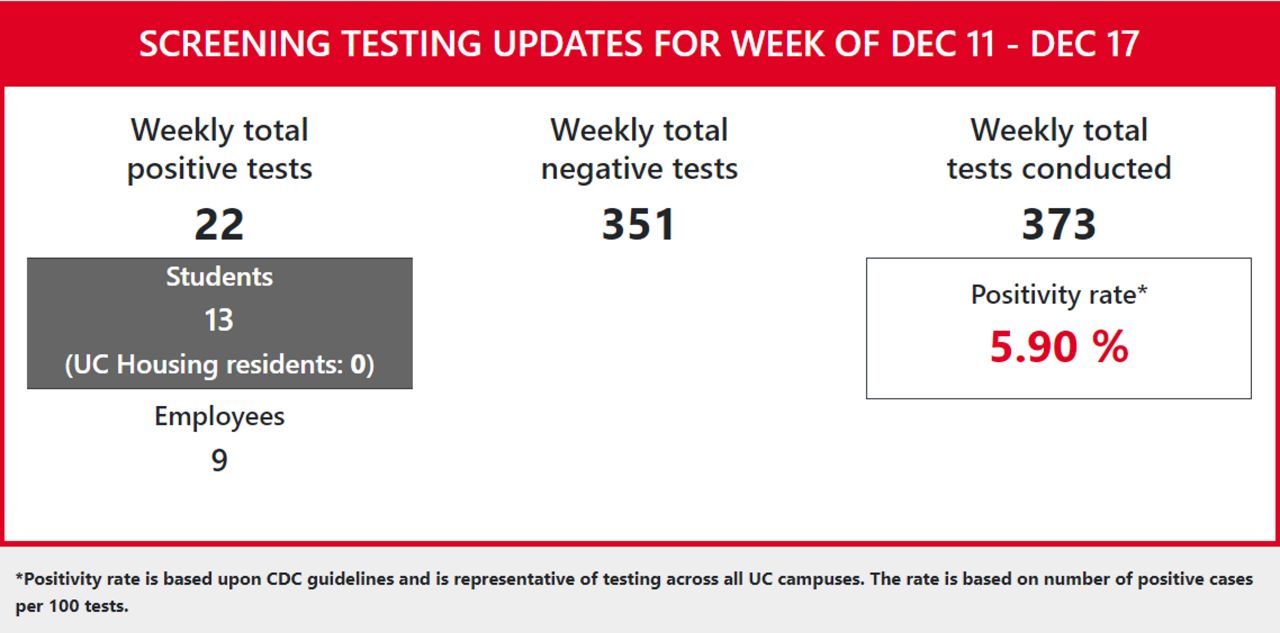CINCINNATI — The University of Cincinnati will go to remote or online learning for the first two weeks of the spring semester in response to local and national surges in the cases of COVID-19.
What You Need To Know
- Due to a surge in COVID-19 cases, the University of Cincinnati will go remote to start to the spring semester
- The plan calls for all school activities to remain digital until at least Jan. 24.
- Part of the uptick is the spread of the omicron variant, a highly contagious version of COVID-19.
- UC is one of several schools across the country forced to make difficult decisions
UC announced on its website that due to the drastic uptick in cases and the high-transmission rate of the omicron variant, the university will transition to a remote-only model from Wednesday, Jan. 5 to through Sunday, Jan. 23. That includes not only classes, but also other university operations and academic support services.
There were 1.08 million cases reported in the United States on Monday, nearly doubling the previous record of 590,576, just set Dec. 29. That number does include a backlog of cases from several states that paused over New Year’s Day weekend. Still, the seven-day average of 480,283 cases is nearly twice as high as last winter’s peak.
In a letter sent Tuesday to faculty and staff, the university made it clear that students can still return to campus residence halls as scheduled on a voluntary basis but, for the time being, those that do must take part in COVID-19 screening, regardless of their vaccination status. UC has not yet released details about that testing process.
The letter is co-authored by Dr. Dustin Calhoun and Valerio Ferme, executive vice president for academic affairs and provost.
The university is advising students that in-person campus events should either be cancelled, minimized per best practices about gatherings, or moved to a remote format.
Campus buildings will remain open to accommodate specific needs, though they'll operate under specific health and safety guidelines. Research activities will operate similarly.
"The winter season break and holidays allowed us to gather with family and friends throughout the region, the country and abroad. Now, the high transmissibility of the omicron variant, both locally and across the country, alerts us to how our activities and interactions with others these past two weeks could potentially impact the health and safety of our university," according to the letter.
Health officials have stated that the omicron variant is less likely than the delta variant to result in hospitalization, but it's highly contagious and hospital beds are still filling up. The last data on UC's health tracker is from the week of Dec. 11. That week, 13 students and nine staff members tested positive.

Current plans call for the university to return to full in-person activities Monday, Jan. 24. The university didn’t specify if it would extend the policy if current COVID-19 trends continue or worsen.
The goal of going online is to allow health officials to assess the impact of omicron on the UC population and "let the spike in transmissions run its course," the school said. The next two weeks will be used to implement added measures for screening, testing and vaccination.
UC advised all faculty, staff and students, who are able, to get COVID booster shots.
“We want to ensure that, when we come back, we come back to a safer, healthier and fully vibrant face-to-face experience,” per the letter.
As a result of the COVID surge, schools and colleges across the country have had to make difficult decisions about their immediate future. Nearby Northern Kentucky University also announced Tuesday that it is delaying the start of spring classes by one week. All classes will now begin on Jan. 18.
NKU is also delaying move-in day for students who are living in residence halls. They are now being asked to move in on Jan. 14, but said accommodations will be made if a student needs to move in sooner.
Like many schools across the country, the University of Cincinnati requiries students, faculty and staff to be vaccinated against COVID-19. Those who have not been fully vaccinated, or have an exemption must participate in weekly screening testing.
With the exception of a few instances — medical exemption and/or eating — masks must be worn at all times when inside UC facilities. Those who are not fully vaccinated are required to wear a facial covering when outdoors and unable to maintain social distancing. Individuals, who are not wearing a facial covering when outdoors, are attesting to compliance with this requirement.
Per the letter, UC believes "high compliance" with its vaccination and masking requirements led to "greater protection and lower transmissibility of the COVID-19 virus" on campus.
